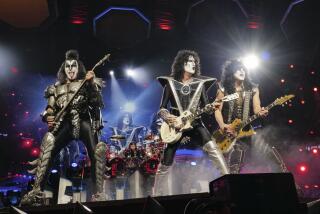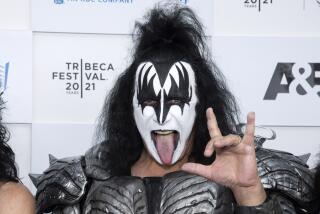HOW I MADE IT: Paul Stanley
- Share via
The gig: Lead vocalist and guitarist for the rock band KISS.
KISS persona: Starchild, recognizable by the painted black star framing his right eye.
Background: Born Jan. 20, 1952, as Stanley Bert Eisen in the Bronx, N.Y., to a furniture salesman and a nurse. Formed a short-lived band, Wicked Lester, with fellow New Yorker Gene Simmons in the early 1970s. They dropped that name and formed KISS with Peter Criss and Ace Frehley in January 1973.
Big dreams: As a child, Stanley was shy but felt in his gut that he could be a rock ‘n’ roll star. “When I first saw the Beatles on ‘Ed Sullivan,’ I was a pudgy, little, unpopular kid. But I had this epiphany that I could do what [the musicians on TV] were doing. To think that when you could count your friends on two fingers, and you’re not the kid who’s taking home the trophy for best looking, is your innate voice talking.”
Early days: KISS struggled early on, but worked to give the impression that it was successful. The band intentionally limited its New York appearances — even though it often had no gigs elsewhere — so fans would think the group was out on tour. The members saved money by setting up their stage equipment themselves, but did so hours early so no concert-goers would see them. For the same reason, they delivered fliers for upcoming engagements in the middle of the night. “There’s no substitute for hard work, for lonely hours and sleepless nights,” Stanley said.
Marketing and makeup: They didn’t call it branding at the time, but KISS did whatever it could to distinguish itself — hence, the garish Kabuki-style greasepaint and 7-inch platform heels. “It was creating an illusion,” Stanley said. “That’s key.”
Hard-working band: Success came partly from KISS’ reputation for raucous live shows — punctuated by Simmons’ infamous fire breathing and blood spitting. “From very early on, I don’t want to say we were a service-minded company, but we were about giving people bang for the buck,” Stanley said. “I wanted to be the coolest-looking band, the loudest band, the one with the most gear on stage, the one blowing stuff up.”
Shutting out noise: The band members largely ignored the scathing reviews KISS regularly received from critics. One exception: an effort to mollify naysayers with an album that broke from the band’s musical style. The album not only inflamed critics further but also got a cold reception from longtime KISS fans. “We did a bloated, self-important and completely ill-conceived concept album in the ‘80s called ‘The Elder,’ ” Stanley said. “That was a time we became more concerned with trying to impress our peers and get credibility from people who didn’t like us. Life’s too short to try to convert people who don’t like you.”
Not overdosing on success: Stanley embraced the stereotypical rock star lifestyle — to a point. “I stayed away from drugs. I saw people around me dying. I remember the first blush of fame, thinking, ‘Gee, this and drugs is a sure recipe for my demise,’ ” Stanley said. “When people said ‘sex, drugs and rock ‘n’ roll,’ I said, ‘You keep the drugs.’ ”
Financial lessons: Since getting burned financially early in his career, Stanley has paid more attention to money. “Anybody who’s foolish enough to say, ‘I’m only in it for the love of what I do,’ is bound to get screwed, because if you’re not attentive to the financial aspects of it, someone else will be,” he said. “And the person who has their arm around your shoulder will have their other hand in your pocket.”
Side gig: Painter. Stanley began painting in 2000 “to let off steam and depressurize.” He later began doing gallery shows and selling his work. He estimates that he sold about $3 million in paintings last year, many to people who are not KISS fans. “There are certainly enough KISS fans who might be introduced through me and find a connection” to his art, he said. But “when you’re spending fifty, sixty, eighty thousand on a piece, there’s not that many KISS fans in that strata.”
Favorite song: “Love Gun.”
More to Read
The biggest entertainment stories
Get our big stories about Hollywood, film, television, music, arts, culture and more right in your inbox as soon as they publish.
You may occasionally receive promotional content from the Los Angeles Times.










